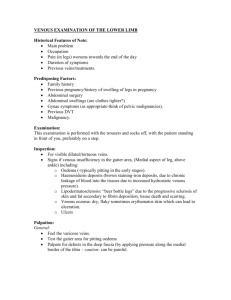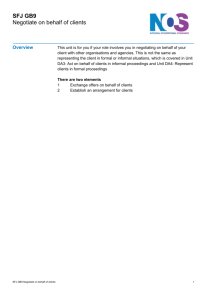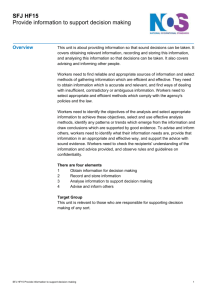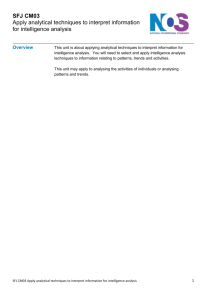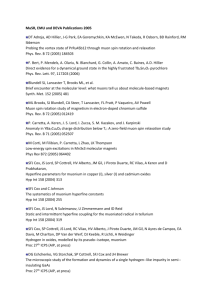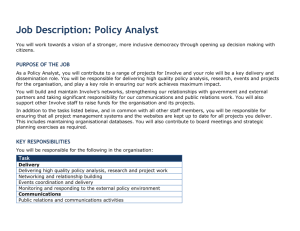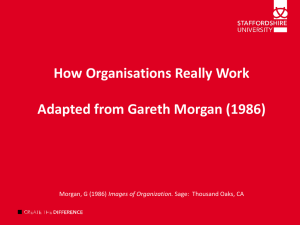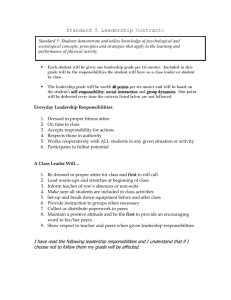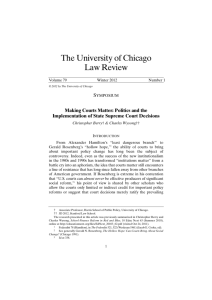SFJ CC503 - NOS Finder
advertisement
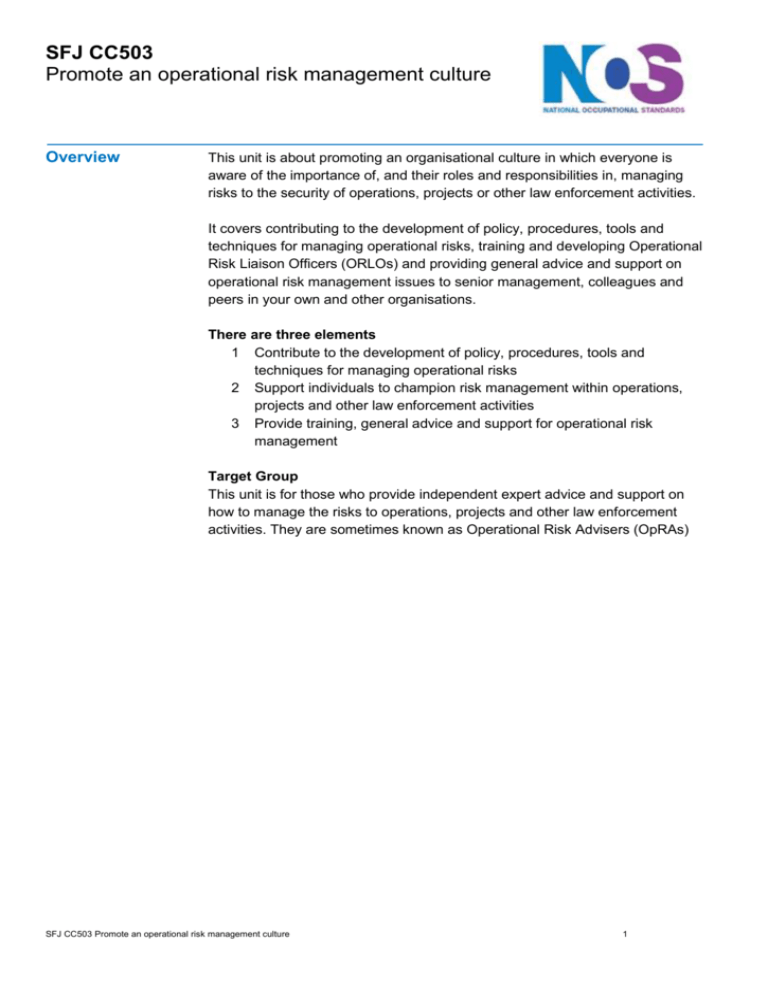
SFJ CC503 Promote an operational risk management culture Overview This unit is about promoting an organisational culture in which everyone is aware of the importance of, and their roles and responsibilities in, managing risks to the security of operations, projects or other law enforcement activities. It covers contributing to the development of policy, procedures, tools and techniques for managing operational risks, training and developing Operational Risk Liaison Officers (ORLOs) and providing general advice and support on operational risk management issues to senior management, colleagues and peers in your own and other organisations. There are three elements 1 Contribute to the development of policy, procedures, tools and techniques for managing operational risks 2 Support individuals to champion risk management within operations, projects and other law enforcement activities 3 Provide training, general advice and support for operational risk management Target Group This unit is for those who provide independent expert advice and support on how to manage the risks to operations, projects and other law enforcement activities. They are sometimes known as Operational Risk Advisers (OpRAs) SFJ CC503 Promote an operational risk management culture 1 SFJ CC503 Promote an operational risk management culture Performance criteria Contribute to the development of policy, procedures, tools and techniques for managing operational risks You must be able to: P1 P2 P3 keep yourself up-to-date with best practice in operational risk management within both your own and other organisations recommend changes to organisational policy and procedures and approved tools and techniques for operational risk management in line with developments in best practice revise and/or develop new policy, procedures, tools and techniques for managing operational risks, as required, in consultation with senior managers, peers and operational managers Support individuals to champion risk management within operations projects and other law enforcement activities You must be able to: P4 P5 P6 P7 work with peers and operational managers to define and develop the role of individuals who champion risk management within operational teams (Operational Risk Liaison Officers or ORLOs) develop and deliver training programmes to introduce individuals to the ORLO role and policy, procedures, tools and techniques for operational risk management provide ongoing training and briefing to continuously develop ORLOs' knowledge, skills and competence in line with developing best practice in operational risk management make yourself available to respond to requests from ORLOs for advice and support on operational risk management Provide, training, general advice and support for operational risk management You must be able to: P8 provide guidance to colleagues on their individual roles and responsibilities in relation to operational risk management P9 provide training, regular briefings and updates on operational risk management issues to senior managers and colleagues within your organisation P10 make yourself available to provide general advice and support for operational risk management to senior managers, operational managers and peers, in line with organisational policy and security requirements SFJ CC503 Promote an operational risk management culture 2 SFJ CC503 Promote an operational risk management culture Knowledge and understanding Legal and organisational requirements You need to know and understand: K1 current legislation, policies, procedures, codes of practice and guidelines relevant to identifying, assessing and managing operational risks and responding to compromises Management of operational risk You need to know and understand: K2 best practice in operational risk management in your own and other organisations and how to keep yourself up-to-date about this K3 the model of operational risk management used by your organisation K4 tools and techniques for managing operational risk approved by your organisation K5 how to revise and develop new policy, procedures, tools and techniques for managing operational risk K6 the importance of consulting with senior managers, peers and operational managers when revising or developing policy, procedures, tools and techniques for managing operational risk, and how to do so effectively K7 the role of ORLOs K8 the importance of making yourself available to provide advice and support on operational risk management issues to senior managers, operational managers, ORLOs and peers , and how to do so K9 the different roles and responsibilities of colleagues in relation to operational risk management and how to provide advice and guidance on their roles and responsibilities K10 how to develop and provide regular briefings and updates on operational risk management issues Training and development You need to know and understand: K11 how to develop programmes to train ORLOs effectively in their role in operational risk management and your organisation's policy, procedures, tools and techniques K12 how to deliver training programmes effectively SFJ CC503 Promote an operational risk management culture 3 SFJ CC503 Promote an operational risk management culture Additional Information Scope/range related to performance criteria 1. peers 1.1 1.2 Links to other NOS CC502 Provide independent advice and support on managing risks to the security of specific operations, projects and other law enforcement activities CC501 Champion operational risk management within an operation, project or other law enforcement activity SFJ CC503 Promote an operational risk management culture in your own organisation in other organisations 4 SFJ CC503 Promote an operational risk management culture Developed by Skills for Justice Version number 1 Date approved November 2008 Indicative review date November 2013 Validity Current Status Original Originating organisation Skills for Justice Original URN SFJ CC503 Relevant occupations Law and legal services; Protective Service Occupations Suite Policing and Law Enforcement Key words police, risk, management, OpRA SFJ CC503 Promote an operational risk management culture 5
